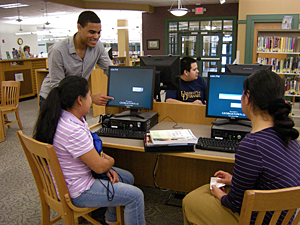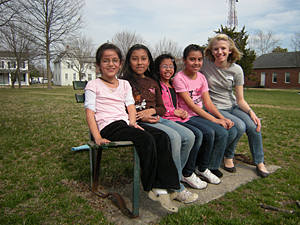ADVERTISEMENT
- Rozovsky wins prestigious NSF Early Career Award
- UD students meet alumni, experience 'closing bell' at NYSE
- Newark Police seek assistance in identifying suspects in robbery
- Rivlin says bipartisan budget action, stronger budget rules key to reversing debt
- Stink bugs shouldn't pose problem until late summer
- Gao to honor Placido Domingo in Washington performance
- Adopt-A-Highway project keeps Lewes road clean
- WVUD's Radiothon fundraiser runs April 1-10
- W.D. Snodgrass Symposium to honor Pulitzer winner
- New guide helps cancer patients manage symptoms
- UD in the News, March 25, 2011
- For the Record, March 25, 2011
- Public opinion expert discusses world views of U.S. in Global Agenda series
- Congressional delegation, dean laud Center for Community Research and Service program
- Center for Political Communication sets symposium on politics, entertainment
- Students work to raise funds, awareness of domestic violence
- Equestrian team wins regional championship in Western riding
- Markell, Harker stress importance of agriculture to Delaware's economy
- Carol A. Ammon MBA Case Competition winners announced
- Prof presents blood-clotting studies at Gordon Research Conference
- Sexual Assault Awareness Month events, programs announced
- Stay connected with Sea Grant, CEOE e-newsletter
- A message to UD regarding the tragedy in Japan
- More News >>
- March 31-May 14: REP stages Neil Simon's 'The Good Doctor'
- April 2: Newark plans annual 'wine and dine'
- April 5: Expert perspective on U.S. health care
- April 5: Comedian Ace Guillen to visit Scrounge
- April 6, May 4: School of Nursing sponsors research lecture series
- April 6-May 4: Confucius Institute presents Chinese Film Series on Wednesdays
- April 6: IPCC's Pachauri to discuss sustainable development in DENIN Dialogue Series
- April 7: 'WVUDstock' radiothon concert announced
- April 8: English Language Institute presents 'Arts in Translation'
- April 9: Green and Healthy Living Expo planned at The Bob
- April 9: Center for Political Communication to host Onion editor
- April 10: Alumni Easter Egg-stravaganza planned
- April 11: CDS session to focus on visual assistive technologies
- April 12: T.J. Stiles to speak at UDLA annual dinner
- April 15, 16: Annual UD push lawnmower tune-up scheduled
- April 15, 16: Master Players series presents iMusic 4, China Magpie
- April 15, 16: Delaware Symphony, UD chorus to perform Mahler work
- April 18: Former NFL Coach Bill Cowher featured in UD Speaks
- April 21-24: Sesame Street Live brings Elmo and friends to The Bob
- April 30: Save the date for Ag Day 2011 at UD
- April 30: Symposium to consider 'Frontiers at the Chemistry-Biology Interface'
- April 30-May 1: Relay for Life set at Delaware Field House
- May 4: Delaware Membrane Protein Symposium announced
- May 5: Northwestern University's Leon Keer to deliver Kerr lecture
- May 7: Women's volleyball team to host second annual Spring Fling
- Through May 3: SPPA announces speakers for 10th annual lecture series
- Through May 4: Global Agenda sees U.S. through others' eyes; World Bank president to speak
- Through May 4: 'Research on Race, Ethnicity, Culture' topic of series
- Through May 9: Black American Studies announces lecture series
- Through May 11: 'Challenges in Jewish Culture' lecture series announced
- Through May 11: Area Studies research featured in speaker series
- Through June 5: 'Andy Warhol: Behind the Camera' on view in Old College Gallery
- Through July 15: 'Bodyscapes' on view at Mechanical Hall Gallery
- More What's Happening >>
- UD calendar >>
- Middle States evaluation team on campus April 5
- Phipps named HR Liaison of the Quarter
- Senior wins iPad for participating in assessment study
- April 19: Procurement Services schedules information sessions
- UD Bookstore announces spring break hours
- HealthyU Wellness Program encourages employees to 'Step into Spring'
- April 8-29: Faculty roundtable series considers student engagement
- GRE is changing; learn more at April 15 info session
- April 30: UD Evening with Blue Rocks set for employees
- Morris Library to be open 24/7 during final exams
- More Campus FYI >>
11:50 a.m., March 21, 2011----In a unique new program that builds on the University of Delaware's storied history of study abroad and its growing presence as a Citizen University, a small cohort of students are immersing themselves in the Latin American culture without ever having to leave the state.
Through “Global at Home: An Alternative Semester Abroad,” 10 students from across the University are enrolled in anthropology, political science and Latin American studies courses taught entirely in Spanish by bilingual professors, as well as a geography course, taught in English, that takes them to southern Delaware six times over the course of the semester to get a firsthand account of the social, economic and political issues faced by the largely Guatemalan residents of Georgetown.
“A lot of schools have service learning and almost every school has study abroad, but 'Global at Home' is about showing the true international character of Delaware,” says Latin American Studies program director Persephone Braham, who helped establish the inaugural program. “Families who have been here many years, often doing the 'invisible work' [of farming, industrial labor and housekeeping], are opening their homes to our students.”
Sussex County 'study abroad'
The Latino population of Sussex County has grown rapidly over the past 20 years, from a few thousand to tens of thousands. Though these migrants come from many different countries, the largest percentage are from Guatemala. Fleeing the violence of civil war there, and attracted to jobs opening up in the poultry industry in southern Delaware, the first wave of Guatemalan immigrants arrived in Georgetown in the late 1980s, many as political refugees. Since the later 1990s, however, most of the Guatemalan immigrants coming to Delaware have been escaping desperate poverty and seeking opportunities for themselves and their families.
Working alongside April Veness, an associate professor of geography whose ethnographic research centers on how the Guatemalan immigrant community of southern Delaware is defining and creating home, the “Global at Home” students are participating in service-learning projects and homestay weekends to learn about the concerns and experiences of Latino residents and the impact of “Latinization” on the small towns there.
Their service-learning projects are sponsored by a variety of community partners, and the students have been placed in one of three agencies, where their duties include: creating multimedia “Stories of Home” with the Latino children from North Georgetown Elementary School who attend at an afterschool program at La Casita/First State Community Action Agency, collecting and translating information for clients at the Murphy Immigration Law firm, and working with adult Latino students from La Esperanza who are practicing their English language and computer skills with resources made available to them at the Georgetown Public Library.
Through “Global at Home,” the students will also spend three weekends with the families, with their final weekend visit set for April 15-17. On May 7, UD will reciprocate the hospitality, inviting the families to spend the day in on campus in Newark.
Having completed two weekend trips already, the students note recurring themes amongst their host families -- language barriers for the parents, Americanization in the children and a persistent sense of living out of two worlds.
This was clearly illustrated for senior Katie LaFleur, an international relations major from Cherry Hill, N.J., when the family dined at Dominos.
“Here we are in this quintessentially American pizza place, huddled together deciding what to eat, and after we picked our toppings, the mother, who speaks no English, hands her son the money to order it all instead of doing it herself,” she recalls. “It was a bit of a culture shock for me,” adds LaFleur, who studied abroad in Spain but views her current experience as “more personal because I'm building a relationship with the family.”
And that, says Veness, is the hope for the students, “to actively contribute to these households through friendship.”
The classroom component
In addition to their experiences in southern Delaware, the “Global at Home” students are currently enrolled in three courses on campus, taught entirely in Spanish: Grupos y Culturas de América Latina, taught by anthropology professor Carla Guerrón Montero; Problemas de política de América latina, taught by political science and international relations professor Julio Carrión; and Culturas y civilizaciones latinoamericanas, taught by Braham.
The courses, open to the larger University community, were filled to capacity with students on the wait list before the semester even began.
“Our goal was to produce a cultural and linguistic immersion experience without taking students abroad,” says Braham, “and the student demand has been terrific.”
The enthusiasm is apparent in the faculty, as well.
For example, Guerrón Montero designed an on-campus service project in which her 20 anthropology students are preparing a radio program on one of five topics -- migration, gender, race, politics, or human rights -- to be aired on WVUD's Spanish program, Latinisimo. The assignment will require students to write the script, select the music, and run the program in Spanish.
In addition to their coursework, all “Global at Home” students participate in excursions, such as a recent day trip to New York, where they visited the Museo del Barrio and watched the Spanish play “La vida en los Esclavos Unidos” (Life in the United Slaves). They attended a conference on Latino issues in March.
Expanding 'Global at Home'
Marion Bernard- Amos, former assistant director of the Department of Foreign Languages and Literatures' study abroad program and current program coordinator for the Confucius Institute, developed the idea for “Global at Home” as a way to build a learning community in the state.
“A partnership built around mentorship, friendship, interpretation of foreign languages, socio-cultural norms and advocacy can lead to positive outcomes for all, from the UD students who wish to perfect their Spanish and gain a better understanding of Latino issues, to the immigrant families who wish to strengthen their ties to the Anglo community, to the statewide organizations that wish to assist Latino families in their efforts to be more active members of society,” she says.
Bernard-Amos hopes to expand this concept of an alternative study abroad program to other populations in Delaware, such as working with the Confucius Institute to build ties with the Chinese community in Hockessin or partnering with the African Studies program to link students with the burgeoning Kenyan population in Bear.
“The state of Delaware is an eclectic mix of people, and we want to find a way of contributing to this diversity,” she says. “We see this as an opportunity to add value to the programs at UD while building on our efforts to engage locally and globally.”
“Global at Home” is run by the Latin American Studies Program. It is funded by the Interdisciplinary Humanities Research Center; offices of the deans in the College of Arts and Sciences and the College of Earth, Ocean, and Environment; Office of Service Learning; Institute for Global Studies; and the departments of Anthropology, Foreign Languages and Literatures, Geography and Political Science and International Relations.
Article by Artika Rangan




